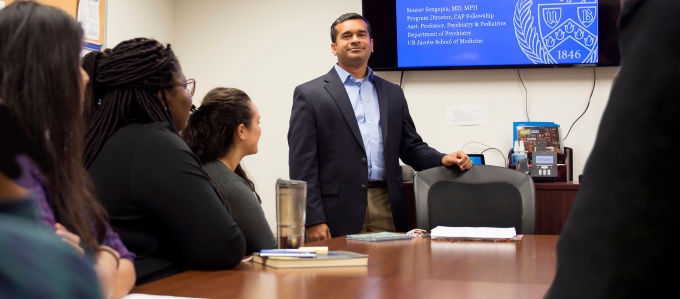
Want to work alongside faculty member Sourav Sengupta, MD, MPH? He serves as director of the learning communities while working to create community connection and foster students’ personal and professional growth.
Faculty: Get Involved
Faculty members: Will you be a trailblazer who helps transform UB’s medical education? By fostering institutional change and implementing our redesigned curriculum, the Jacobs School is giving students a critical key to success. But for real change to occur, we need your skills, expertise and enthusiasm.
Who can best educate and mentor our medical students? You. With your wisdom, professionalism, life experience and unique knowledge, you can be a part of the successful launch of our innovative Well Beyond curriculum in July of 2024.
There are two essential aspects of our revised curriculum: learning communities and case-based inquiry learning programs. Faculty involvement is key in both components.
A learning community is: an intentionally formed group of students and faculty who are actively engaged in learning from and with one another. Learning communities will serve as “home base” for Jacobs students as they learn the knowledge and skills they’ll need to be doctors, seek feedback and guidance toward becoming physicians, and explore the art, practice, and perils of medicine.
Case-based inquiry learning (CBIL) is: a core learning modality for the first phase of medical school. Of course, using real-life clinical scenarios to provide context for course subject matter has been long-used in medical education. But CBIL is structured to create an environment that promotes understanding via student-led discussion, inquiry and investigation. This modality is crucial in preparing students to undertake their health sciences scholarly project, which spans the course of their schooling, under the guidance of their research mentor.
You can help implement these two critical elements of our revised curriculum.
As a learning community coach, you will work with the same small group of students throughout all four years of medical school, teaching core doctoring skills (e.g., patient interviewing and physical exam), providing direct observation and feedback on clinical and leadership skills, and supporting their professional identity formation and engagement with our local community.
You can expect to play an integral role as the main instructor for this learning community curriculum for your group of students, as well as a coach and mentor throughout all four years of medical education.
This is your opportunity to pass along your knowledge and help curious students understand how they can best apply their knowledge. This is your chance to foster an inviting, supportive environment for medical students — so they can learn under the best possible circumstances.
Case-based inquiry learning (CBIL) is a program of twice weekly small-group educational sessions that are student-led and faculty-facilitated to contextualize medical knowledge within real-life clinical scenarios. CBIL utilizes patient scenarios (cases) to structure student learning. In this approach, you will use cases to facilitate a comprehensive understanding of health and patient care. How? Through the integration of foundational sciences, clinical sciences, humanism/humanities, scientific literacy and inquiry, and health systems science.
This program is student-centered and promotes students’ self-directed learning — but that learning works best with your help. Students must have guidance from a facilitator (namely, you!) to succeed. You will need to provide oversight to the group of students while they collaborate to address real life patient scenarios. In the first 14 months of the curriculum (Phase 1), students will participate in two sessions of CBIL per week in groups of eight students with a faculty facilitator.
This is a fantastic opportunity for you to network with other instructors across the medical school.
As a facilitator, you do not need to be a content expert; you may bring knowledge and experiences from various fields — scientific, health professions, etc.
There’s no better time to get involved. Apply now as a learning community coach or a case-based inquiry learning facilitator and play a significant role in our redesigned curriculum.
Help us transform medical education at UB.
You have the power to help students be exceptional physician leaders for the decades ahead.